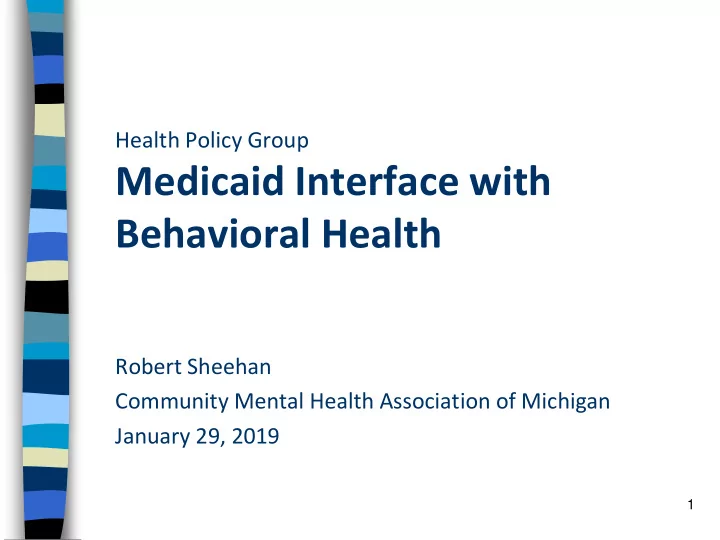

Health Policy Group Medicaid Interface with Behavioral Health Robert Sheehan Community Mental Health Association of Michigan January 29, 2019 1
System structure and funding Michigan, like most states with advanced mental health systems, has a mental/behavioral health unit separate from the state’s Medicaid office. 2
Management and provision of Medicaid behavioral health services – Community Mental Health (CMH) centers serving all 83 counties – Public, risk-bearing Prepaid Inpatient Health Plans ((PIHP) public health plans formed and governed by the CMH centers) – Private providers within the CMH and PIHP provider networks 91% of system funding from Medicaid 3
4
5
What distinguishes advanced mental health services from physical healthcare funded under Medicaid traditional medical/clinical services (psychiatry, psychotherapy) non-traditional human/social services supported independent living, drop in centers, outreach casemanagement, vocational services, peer-led services, respite services, supported housing, jail diversion, clubhouses, homebased therapy, wraparound services) 6
Central to its work is addressing the social determinants of health : housing, employment, education, transportation, community and family connection, legal/corrections involvement, etc.) 7
core themes in the mental health system unlike those in the traditional Medicaid physical health system: – civil liberties (in that involuntary treatment is one of the court dimensions of the system) – public safety – guardianship and the limitation of a person’s right to make decisions on his or her behalf – stigma around mental health needs – both legal and illegal behavior (the use of drugs and its prevention and treatment) 8
The system fulfills a range of functions unlike traditional Medicaid physical health payer and provider system: Mental health safety net Community convener and collaborator Advocates for vulnerable populations Sources of guidance and expertise to the local community 9
Because of its unique role and the focus on social determinants, the work of the system is dictated by a blend of Medicaid standards and local resources and needs . Thus local dollars, federal dollars, and state dollars, outside of Medicaid funding are woven into the service delivery mix, at very different levels across the state. 10
The public system is also charged with serving those not on Medicaid (the other 8 million Michiganders ), but with a very small non-Medicaid budget ($7.50 per person per year) for mental health services per person is not covered by Medicaid 11
Because the persons served by the mental health system have, in the main, chronic mental health conditions and are some of the most vulnerable members of their communities A uniquely comprehensive person- centered approach to care – far more in- depth than applied in the physical health system A strong recipient (client/patient) rights program 12
The behavioral health side of MDHHS takes a lead role, as do similar offices in other states with advanced behavioral healthcare systems, in identifying, fostering and requiring the use of a wide range of evidence-based and promising practices 13
The role of those served/clients is far more in/depth and related to the leadership and direction of the system than additional Medicaid: persons served make up 1/3 of the Boards of Directors of the state’s CMHs Over 1,100 clients/persons served are on the clinical staff of the CMHs and providers as peer support specialists 14
The state’s behavioral health system grew out of a community response to the state psychiatric hospital system converting a system dominated by state hospital care to a community-based system of care 15
If Michigan’s CMH/PIHP budget were still used to fund inpatient care in the state psychiatric hospitals and developmental disability centers, 8,500 persons would be served each year With community- based care, Michigan’s CMH/PIHP/Provider system serves over 300,000 persons each year - representing a 35 fold increase in the number of persons who can be served through community- based care when compared with state institutional care 16
In closing : What distinguishes advanced mental health services from physical healthcare funded under Medicaid is what has allowed the rapid advance of the system, making it one of the best and most comprehensive in the country 17
Recommend
More recommend